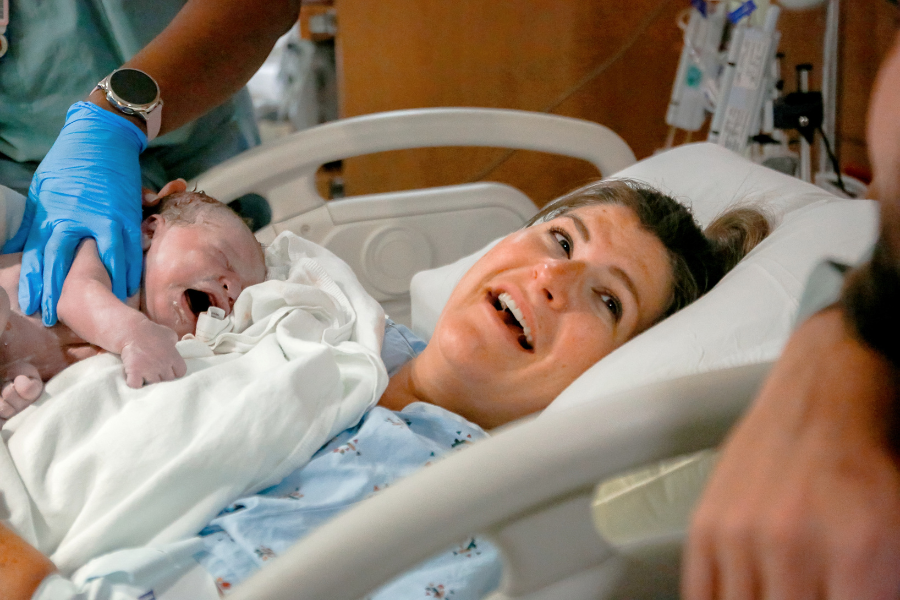There’s a very good chance that you will experience anemia at some point in your pregnancy. While the likelihood of it being severe, with a true impact on you or your little one, is pretty slim, that also doesn’t mean it should just be ignored!
Because anemia can make you feel very foggy, tired, and uncomfortable – and if you’re pregnant you already have enough of that going on!
In today’s article, you will learn everything you ever wanted to know about anemia in pregnancy. I will discuss the most common types of anemia in pregnancy, causes and signs of anemia in pregnancy, potential risks, and ways to cope.
So, if you are ready, let’s dive in, come along with me to learn all about anemia in pregnancy.
Follow @mommy.labornurse on Instagram to join our community of over 650k for education, tips, and solidarity on all things pregnancy, birth, and postpartum!
What is anemia?
I’m sure you’ve heard the term many times before, but do you actually know what anemia is? Simply put, anemia occurs when you don’t have enough healthy red blood cells (RBC) in your blood. Hemoglobin, an important protein found in RBCs, is used to transport oxygen throughout the body.
As you might expect, anemia can leave you feeling tired, weak, dizzy, or even worse, if you experience a more severe form. Thankfully, as I said earlier, the majority of pregnant women experience mild anemia with mild (if any) symptoms.
Types of anemia in pregnancy
You might know this and you might not but there are actually several different types of anemia.
Iron deficiency anemia
The most common type of anemia in pregnancy is iron deficiency anemia. As the name implies, iron deficiency anemia is a result of not having enough iron. Iron is used to produce RBCs. If you don’t have enough iron then your body can’t produce RBCs like it should.
The good news is that mild iron deficiency anemia usually can be corrected with a daily iron supplement and increasing the amount of iron-rich foods in your diet. Mild iron deficiency anemia doesn’t typically have a significant impact on mama or baby.
Vitamin B-12 deficiency anemia
Like iron, Vitamin B-12 also plays an important role in red blood cell formation. You can find Vitamin B-12 in foods such as meat, dairy, fish, and poultry. While not super common in the U.S., Vitamin B-12 deficiency might be more common in those who follow a vegan or vegetarian diet.
If you’re eating a well-balanced diet, you’ll likely be just fine! Without risk factors, routine Vitamin B-12 testing isn’t usually done during pregnancy. If you feel like this is something you are at risk for or something you might be experiencing, I encourage you to bring it up with your OB provider.
Folate deficiency anemia
“Folic acid, also known as folate, is a B vitamin that is important during pregnancy. Folic acid may help prevent major birth defects of the fetus’s brain and spine called neural tube defects (NTDs).” (source)
During pregnancy, you need 600 micrograms of folic acid every day. It can be hard to get this much folic acid from food alone. To ensure you are getting enough, take a daily prenatal vitamin with at least 400 micrograms of folic acid in it.
It is important to take a prenatal vitamin prior to, during, and after pregnancy, but especially important during those first 12 weeks of pregnancy.
Folate deficiency anemia is, well, just like it sounds. It is anemia due to not having enough folic acid in your system. Folic acid is another component of RBC production so without it your body will not have as many red blood cells.
If you are looking for foods high in folate, focus on the dark leafy green vegetables, citrus fruits, eggs, legumes, and fortified grains, to name a few.
Causes of anemia in pregnancy
Depending on the type of anemia, the cause might differ. As discussed above, there are several different types of anemia you might experience during pregnancy. Being deficient in certain vitamins and minerals is the main cause; this can be made more severe by pregnancy. All the more reason why taking a prenatal vitamin during pregnancy is so, so important!
Signs of anemia in pregnancy
As we have determined, pregnancy can put you at an increased risk for anemia. How can you determine if you are experiencing anemia during pregnancy? Here are some of the most common signs of anemia in pregnancy.
- Fatigue
- Feeling lightheaded or dizzy
- Shortness of breath
- Headaches
- Difficulty concentrating
The majority of women who experience anemia during pregnancy experience a pretty mild version with minimal symptoms. You can expect to have routine prenatal blood work completed several times throughout pregnancy. One test that will be done with the blood work is a complete blood count (CBC) that can test for anemia.
Risks of anemia in pregnancy
Anemia is common in pregnancy but remember, most women that experience anemia in pregnancy, experience a mild form of it. Mild anemia is common and typically without any significant risks for you or baby.
According to Mayo Clinic, “Severe iron deficiency anemia during pregnancy increases the risk of premature birth. Iron deficiency anemia during pregnancy is also associated with having a low birth weight baby and postpartum depression.” (source) Anemia can also affect your baby’s growth, especially in the first trimester.
Worry not though, most pregnant women do not experience severe anemia in pregnancy, so try not to lose sleep over this one, mama!
How to treat anemia in pregnancy
The easiest way to treat anemia in pregnancy is to make sure you are eating a healthy, balanced diet. Your nutritional needs change during pregnancy. You need more of certain nutrients and vitamins during pregnancy to ensure a healthy pregnancy and healthy developing baby.
Related Listening: EP25: Common Nutritional Needs During Pregnancy
Another easy way to prevent and treat anemia in pregnancy is to take a daily prenatal vitamin. A good prenatal vitamin can help you get all those extra vitamins and minerals that you might be missing from diet alone.
I tried a few different brands of prenatal vitamins during pregnancy and ended up taking the ones by Ritual. One of the many things I loved about them is that they were so easy to swallow because they actually taste and smell like lemons! You can learn more about Ritual vitamins here!
A daily, over-the-counter, iron supplement can help battle anemia too! If you do go the OTC iron supplement route, just make sure to add a daily stool softener too. Iron can leave you feeling a little…backed up and nobody wants or deserves to deal with constipation on top of pregnancy.
Interested in more?
This article was all things anemia but did you know I actually have nearly 400 (!) pregnancy, birth, postpartum, and newborn related blogs on my website?! Not to mention my own podcast with hundreds of episodes too.
If you like what you read here and are looking for more pregnancy and birth related content be sure to check out my website and the resources below!
Cheers to an even better birth, mama!





